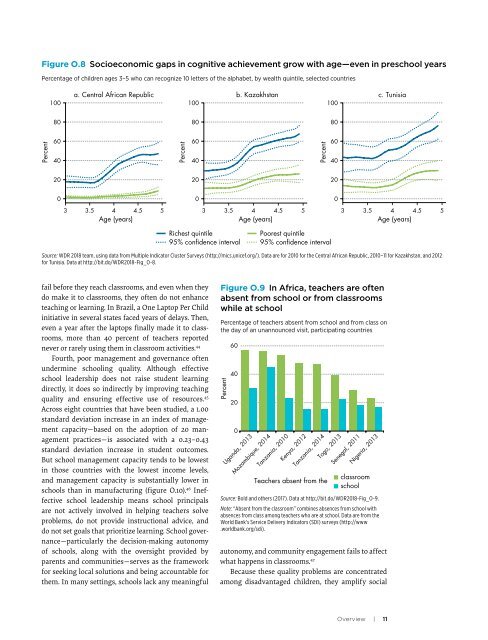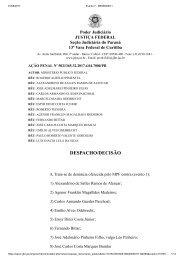Brasil só deve dominar Leitura em 260 anos, aponta estudo do Banco Mundial Relatorio Banco Mundial _Learning
Create successful ePaper yourself
Turn your PDF publications into a flip-book with our unique Google optimized e-Paper software.
Figure O.8 Socioeconomic gaps in cognitive achiev<strong>em</strong>ent grow with age—even in preschool years<br />
Percentage of children ages 3–5 who can recognize 10 letters of the alphabet, by wealth quintile, selected countries<br />
100<br />
a. Central African Republic<br />
100<br />
b. Kazakhstan<br />
100<br />
c. Tunisia<br />
80<br />
80<br />
80<br />
Percent<br />
60<br />
40<br />
Percent<br />
60<br />
40<br />
Percent<br />
60<br />
40<br />
20<br />
20<br />
20<br />
0<br />
0<br />
3 3.5 4 4.5 5<br />
3 3.5 4 4.5 5<br />
3 3.5 4 4.5 5<br />
Age (years) Age (years) Age (years)<br />
Richest quintile<br />
Poorest quintile<br />
95% confidence interval 95% confidence interval<br />
Source: WDR 2018 team, using data from Multiple Indicator Cluster Surveys (http://mics.unicef.org/). Data are for 2010 for the Central African Republic, 2010–11 for Kazakhstan, and 2012<br />
for Tunisia. Data at http://bit.<strong>do</strong>/WDR2018-Fig_O-8.<br />
0<br />
fail before they reach classrooms, and even when they<br />
<strong>do</strong> make it to classrooms, they often <strong>do</strong> not enhance<br />
teaching or learning. In Brazil, a One Laptop Per Child<br />
initiative in several states faced years of delays. Then,<br />
even a year after the laptops finally made it to classrooms,<br />
more than 40 percent of teachers reported<br />
never or rarely using th<strong>em</strong> in classroom activities. 44<br />
Fourth, poor manag<strong>em</strong>ent and governance often<br />
undermine schooling quality. Although effective<br />
school leadership <strong>do</strong>es not raise student learning<br />
directly, it <strong>do</strong>es so indirectly by improving teaching<br />
quality and ensuring effective use of resources. 45<br />
Across eight countries that have been studied, a 1.00<br />
standard deviation increase in an index of manag<strong>em</strong>ent<br />
capacity—based on the a<strong>do</strong>ption of 20 manag<strong>em</strong>ent<br />
practices—is associated with a 0.23–0.43<br />
standard deviation increase in student outcomes.<br />
But school manag<strong>em</strong>ent capacity tends to be lowest<br />
in those countries with the lowest income levels,<br />
and manag<strong>em</strong>ent capacity is substantially lower in<br />
schools than in manufacturing (figure O.10). 46 Ineffective<br />
school leadership means school principals<br />
are not actively involved in helping teachers solve<br />
probl<strong>em</strong>s, <strong>do</strong> not provide instructional advice, and<br />
<strong>do</strong> not set goals that prioritize learning. School governance—particularly<br />
the decision-making autonomy<br />
of schools, along with the oversight provided by<br />
parents and communities—serves as the framework<br />
for seeking local solutions and being accountable for<br />
th<strong>em</strong>. In many settings, schools lack any meaningful<br />
Figure O.9 In Africa, teachers are often<br />
absent from school or from classrooms<br />
while at school<br />
Percentage of teachers absent from school and from class on<br />
the day of an unannounced visit, participating countries<br />
Percent<br />
60<br />
40<br />
20<br />
0<br />
Uganda, 2013<br />
Mozambique, 2014<br />
Tanzania, 2010<br />
Kenya, 2012<br />
Tanzania, 2014<br />
Teachers absent from the<br />
Togo, 2013<br />
Senegal, 2011<br />
Nigeria, 2013<br />
classroom<br />
school<br />
Source: Bold and others (2017). Data at http://bit.<strong>do</strong>/WDR2018-Fig_O-9.<br />
Note: “Absent from the classroom” combines absences from school with<br />
absences from class among teachers who are at school. Data are from the<br />
World Bank’s Service Delivery Indicators (SDI) surveys (http://www<br />
.worldbank.org/sdi).<br />
autonomy, and community engag<strong>em</strong>ent fails to affect<br />
what happens in classrooms. 47<br />
Because these quality probl<strong>em</strong>s are concentrated<br />
among disadvantaged children, they amplify social<br />
Overview | 11








